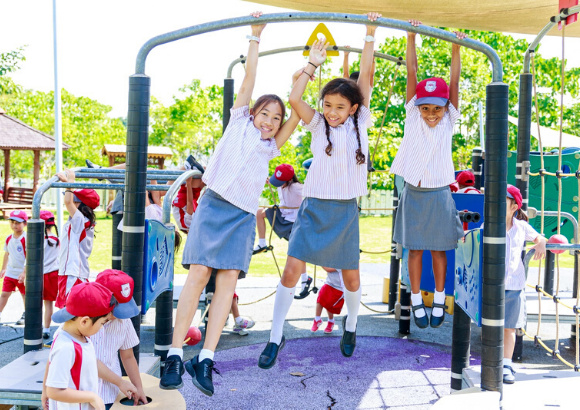Importance of Balancing Technology with Outdoor Exposure in Children
 Schooladvisor Team
Schooladvisor TeamTechnology is a powerful tool that can transform and support education in a number of ways. It has increased the accessibility of education and the ability for students to learn remotely, and everything is accessible globally as long as you have the right internet tools and good internet connection. For example, Kolej Tuanku Ja’afar teachers use software such as the Google Suite, Padlet and Nearpod as well as interactive whiteboards, iPads and laptops to help to make learning more engaging and varied.
James Twigg, Head of Primary at KTJ says, “We live in a technological world. It is important that our children are fully prepared to play a leading role in it. Hence, being able to use technology as a problem solving tool is important learning in itself. Using technology purposefully and effectively also supports learning across the curriculum.”
It is important to note studies have shown that too much use of technology at a young age can have a negative impact on children. This might include a disruption to sleep patterns or poor mental health. That is why, KTJ Primary recognises the need to balance technology use with outdoor learning and play. Twigg notes children need to keep fit and healthy in body and mind to ensure they receive the exercise, fresh air and variety of experiences they need to thrive.
A 2017 research project seeking to transform educational practices fleshes out some importance of outdoor play for healthy development in young children:
Fun with endless learning possibilities
Outdoor play offers children contact with natural elements. Not only are natural elements such as sticks, rocks, flowers, soil and water sustainable, free and easy to find, it offers more possibilities for play and drive children’s curiosity as compared to the limited options commercial toys provide.
It is good to note exploration of natural elements can promote education in its broadest sense. For example, a child will expand their vocabulary through learning the names of flora and fauna, while learning math and science through the observation of plants and animals.
Besides that, exploration of natural elements at an early age also allows parents and guardians to instil ecological and sustainable behaviours in children by bringing attention to the richness and diversity of nature. KTJ exemplifies these values with its environmental ethos – the school uses renewable energy through solar panels, recycle waste materials, and aims to be a carbon neutral school by 2050.
Building character out of treehouses
Contrary to childhoods of the past, the study suggests today’s children are brought up in a “safer environment” due to a culture of fear. Unfortunately, this can lead adults to underestimate children’s capabilities – potentially creating a more “dangerous” environment where children do not have the opportunity to learn how to stay safe by experience. Of course, an adult should supervise risky play and support the child if necessary.
KTJ Primary recognises the importance of encouraging safe risk taking for a child's development and self-confidence. Thus, it provides separate outdoor play areas specifically designed for children of different ages. The lower play area is suitable for children aged 3 - 6 while the upper play area is suitable for children aged 7 - 11. These play equipment provides students with opportunities to overcome challenges and test their abilities whilst under the constant supervision of a teacher.
When children are allowed to experience failure and success through trial and error during play, they develop strong character and skills such as persistence, entrepreneurship, self-knowledge and problem solving. Preventing risky situations will not allow children to deal with unpredictable environments, lacking the necessary confidence to overcome challenges in an autonomous way.
Working together to problem solve during risky play also teaches children cooperation – sharing their knowledge and skills to accomplish different tasks or challenges. Children develop empathy too as they begin to understand other's people feelings and needs. Twigg says, “A child should be able to explore a whole-world of learning, and technology is only one part of this. Children need real life experiences – time outside to play and interact with each other. A holistic education provides this and gives children an opportunity to find their interests and talents.”
A balance with a purpose
One cannot deny that dependency on technology is inevitable in current society. It is almost impossible now to picture a classroom without at least a computer and screen projector, and more students look to the internet for information. In the near future, almost all jobs will require some knowledge of technology use as well.
Hence, parents and educators need to form a balanced education of technology use and outdoor play to ensure our children will grow into well-rounded human beings. If you don’t know where to start, Twigg suggests parents share a variety of different experiences and hobbies with their children, especially activities that encourage quality time away from technology.
Looking for a school which practices the right balance of technology and outdoor learning for your child?
Kolej Tuanku Ja’afar ensures its students are provided a balanced amount of academic, creative, physical, social and emotional development. Its 32ha school campus nestled in Mantin, Negeri Sembilan houses plenty of facilities and opportunities for supervised outdoor play, and students keep fit and healthy with physical education and swimming activities.
Its students are also not left behind in digital literacy as it is imbued into the school curriculum and students are given the freedom to explore their technological skills appropriately. For example, KTJ’s skilled staff and teachers use interactive whiteboards, iPads, laptops and a wide range of software and IT hardware to further students’ learning effectively. Moreover, Google Classroom, Zoom and many other interactive learning tools were used during the MCO period to ensure children were not left behind in their studies.
Want to know more on how KTJ raises well-rounded students in digital literacy, physical health and academic excellence? Visit Kolej Tuanku Jaafar KTJ School, contact Jane Wong at registrar@ktj.edu.my or call +606 -758 2561.

